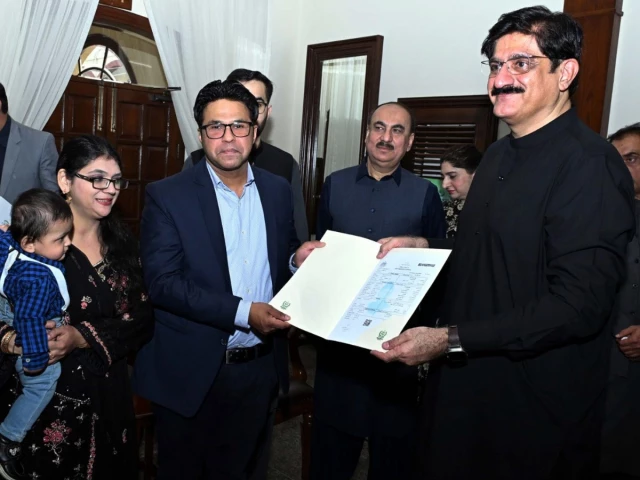Province ends queues and paperwork with Civil Registration Management System mobile app
Sindh CM Murad Ali Shah presents a birth certificate to a parent during the launch of the Civil Registration Management System (CRMS) mobile application at CM House in Karachi on November 28. PHOTO: PPI
KARACHI:
In a major push towards digital governance, Chief Minister Murad Ali Shah launched the Civil Registration Management System mobile application – a platform that now allows citizens to register births, deaths, marriages and divorces online, without visiting a government or relevant office.
Terming the initiative as a “milestone in Sindh’s transition to a digital future”, the chief minister said, the system would eliminate queues, paperwork and delays, and make essential services accessible to people across the province, especially those living in remote and underserved areas.
Home registrations
The Civil Registration Management System (CRMS) mobile application, developed in collaboration with NADRA, is part of the larger Electronic Civil Registration and Vital Statistics (e-CRVS) system, approved at a cost of Rs 471 million. The system will cover 30 districts and 769 health facilities, ensuring that 85% of births taking place in public and private hospitals are recorded digitally.
Read: The increase in mobile operator prices under the terms of the PTA is “justified”
Shah said the app would also integrate immunization records, disease surveillance and patient identity management, enabling accurate, real-time data critical to planning and public health.
“The civil status for long remained weak because many less privileged families could not afford the NADRA fees,” the chief minister noted. “To remove this obstacle, the Sindh cabinet has decided that the provincial government will pay all NADRA fees for birth and death registration.”
Mandatory registration of births within hours
The chief minister announced that birth registration would be made compulsory across Sindh immediately after the birth of the child. “In five years, the mapping and school planning of every child will be based on this data,” he said, ordering hospitals to ensure instant registration of all newborns.
He added that implementation at the union council level would be crucial and that the performance of local representatives would now be assessed based on registration rates.
Shah pointed out that all Sindh cabinet meetings have already shifted to a completely paperless system. The provincial government now aims to extend digital reforms to domicile issuance, social welfare systems, health records, licensing and electronic payments, consolidating them under a secure and unified digital platform.
NADRA, he said, has been a “critical partner” through solutions such as Pak-ID, and will ensure its data security and privacy standards also extend to the new system.
The healthcare sector will benefit from integrated data
Provincial Health Minister Dr Azra Fazal Pechuho briefed the Chief Minister on the network of 769 health facilities now connected to the new system. The integrated data, she said, would support programs such as the electronic immunization registry and help target interventions against diseases such as thalassemia.
NADRA Director General Amir Ali Khan and Local Government Secretary Waseem Shamshed signed a supplementary agreement confirming NADRA’s role in securing and maintaining the CRMS mobile application. All terms of the original memorandum of understanding remain intact.
Chief Secretary Asif Hyder Shah said the Digital Sindh initiative would ensure both transparency and accuracy in governance processes.




